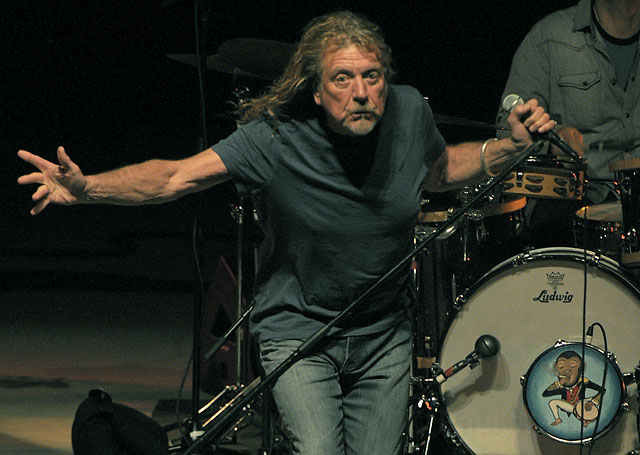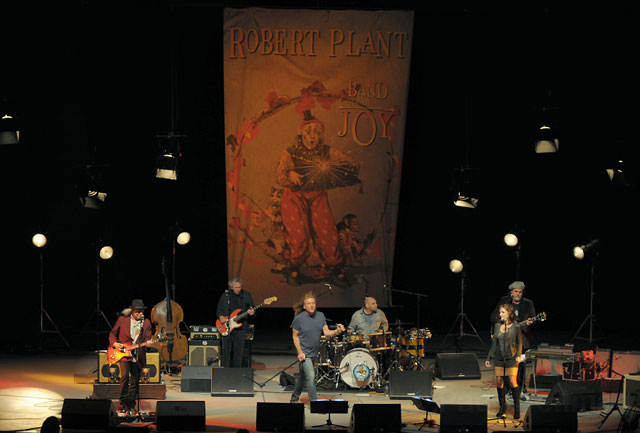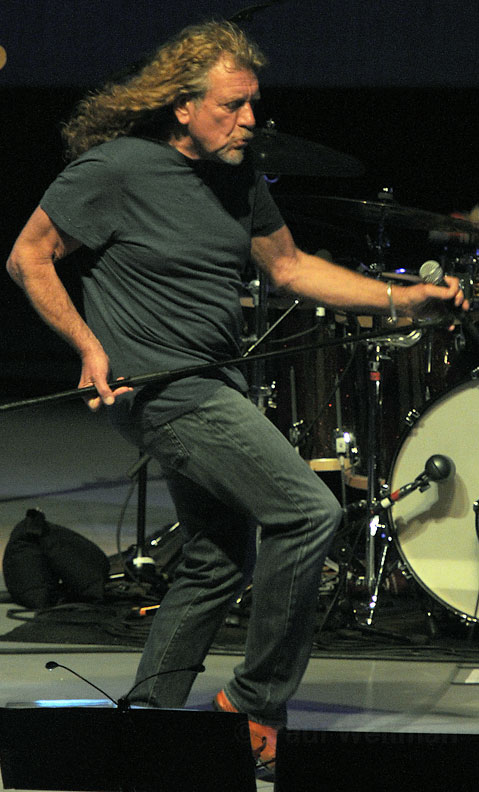Robert Plant at the Santa Barbara Bowl
The Band of Joy Joins Legendary Rocker on Monday, April 25

It’s been a long time since Robert Plant and John Bonham put together their first group and dubbed it the Band of Joy. As the hardcore fans out there undoubtedly know, the original Band of Joy was Bonham and Plant, who, frustrated by their inability to land a record contract back in 1967, hooked up with guitarist Jimmy Page and bassist John Paul Jones to form Led Zeppelin. So why is Plant reviving the old Band of Joy name these many years later? As was apparent from the opening notes of “Black Dog” at the Bowl on Monday night, it’s because the music he’s making today takes it all back to the beginning, when Plant and best bud Bonzo (Bonham) were still discovering the legacy of the blues. Today’s Band of Joy—with Patty Griffin on guitar and vocals, Darrell Scott on multiple instruments and vocals, Byron House on bass and vocals, Marco Giovino on drums, and legendary Nashville session guitarist Buddy Miller at the helm—may be a very different-sounding affair than the original, but it retains that intimate connection to the music that’s long been called “the real American underground.” Mixing folk, bluegrass, blues, gospel, and the Indo-jazz of North Africa, Plant, who may be the greatest living rock vocalist, weaves a multilayered concert experience that, while it may not achieve the massive impact of Led Zeppelin circa 1975, nevertheless leaves a powerful impression and still tingles with the magic of Plant’s trademark moans and cries.

Plant is nothing if not generous in his latest incarnation, both with the group onstage and with a large host of collaborating songwriters. On Monday, he sang music by Los Lobos, Jefferson Airplane, a traditional song (“And We Bid You Goodnight”) most commonly associated with the Grateful Dead, “Satan, Your Kingdom Must Come Down”, and Richard Thompson’s “House of Cards.” When he wasn’t up front, wielding the microphone stand in his inimitable swaggering rock-star manner, Plant was off to the side, singing harmony or blowing harp while Griffin, Miller, or Scott took turns as the lead. The hallmark of this Band of Joy is its democracy, and the deep blend of acoustic and electric instruments that has spread to become Plant’s signature today.

Joking that with the night’s huge gusts of wind he felt like he was in a Neil Young video, Plant took the groove in nearly as many directions as the weather blew his hair. One moment we were deep in the Mississippi Delta, exploring the country blues with Scott’s banjo and Miller’s guitar, and the next we were in North Africa, with Plant’s “Kashmir” voice caterwauling over the top of snaky, sitar-like melodies. For “Ramble On,” the night’s climactic Zeppelin number, Plant and Miller chose to avoid possible comparisons to Jimmy Page by redirecting the arrangement toward a mandolin breakdown. Although, to these ears, there was something missing, Plant nevertheless made the most of his new context, using the softness of his accompaniment to add drama to his vocal reentry. And it worked. From the 1960s in England to the mountains of North Africa and now to Nashville and beyond, Robert Plant consistently brings his unique brand of vocal joy to every show he plays.



